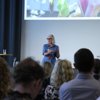Fritextsökning
Artiklar per år
Innehållstyper
-

Anna Törner: ”Mom, do you think you’ll ever get married again?”
”I realize I’m slowly descending into that familiar statistical rabbit hole, where life’s biggest uncertainties are reduced to point estimates and confidence intervals”, Anna Törner writes in a column.
-

“We should avoid surgery if we can”
Since February this year, she has been Scientific Director Life Science at the Karolinska Institutet. Life Science Sweden met Anna Martling for a talk about role models, surgery and Sweden’s strengths and weaknesses in medical research.
-

Anders Bengtsson prisas för forskning om SLE
Forskaren och professorn Anders Bengtsson prisas för sin forskning på systemisk lupus erythematosus (SLE). Han får årets stipendium till Nanna Svartz minne som delas ut av Reumatikerförbundet och Pfizer.
-

Takeover bid is being completed – Japanese company acquires Calliditas
Japanese company Asahi Kasei completes the bid for Calliditas Therapeutics after reaching over 90 percent of the shareholding. Callidita's board has now decided to apply for delisting of the company´s share from Nasdaq Stockholm.
-

Artificial intelligence in radiology – “Risk prediction is very exciting”
A growing number of solutions based on artificial intelligence are being developed and used in healthcare. According to Sophia Zackrisson, Professor of Radiology at Lund University, radiology is a field that is well suited to the technology.
-

Anna Törner: Yes, I Am Sick, But Not Weak
”People often say that someone who is ill only has one wish—to get better. But I think that is not true. Someone who is ill also longs to be understood, to be respected, to not have their identity overshadowed by their condition”, writes Anna Törner in a column.
-

Thumbs down for lecanemab in the EU – “Very surprised”
The Azheimer's drug lecanemab has received a negative assessment from the European Medicines Agency’s Committee for Medicinal Products for Human Use (CHMP), according to an announcement made by the Agency last week. Bioarctic’s CEO Gunilla Osswald describes the reactions after the announcement as a surprise and disappointment.
-

Läkemedelsjätte byter namn och skärper fokus – ”Vi har ett guldläge”
Världens största läkemedelsföretag toppar numera försäljningen även i Sverige – men är ändå något av en doldis här. Men ett färskt namnbyte och en tydligare inriktning på sjukvård är tänkt att ändra på det, säger Duarte Marchand, Sverige- och Nordenchef för Johnson & Johnsons läkemedelsverksamhet, i en intervju.
-

Gothenburg, the city of life science – We are ‘Little Boston’
Western Sweden is investing in life science within everything from advanced therapeutic drugs to femtech. At the same time, stakeholders are looking to other industries for inspiration and knowledge.
-

Life science-staden Göteborg – Vi är ”Lilla Boston”
I Västsverige satsar man på life science inom alltifrån avancerade terapiläkemedel till femtech. Samtidigt blickar aktörerna mot andra branscher för inspiration och kunskap.
-

Sofia Wallström is Lif's new CEO
Sofia Wallström has been appointed as the new CEO of the industry organization Lif, the trade association for the research-based pharmaceutical industry in Sweden.
-

Nobel Prize winner Torsten Wiesel turns 100: “Old men like me should use their experience to help the young”
In 1955, a young Torsten Wiesel jumped on a boat to the US and embarked on a fabulous career as a neuroscientist, crowned with a Nobel Prize for his work. Now 100 years old, he looks back on an intense life and his upbringing in Stockholm, Sweden, which shaped his desire to help the vulnerable in society.
-

Innovative start-up helps doctors, scientists and industry balance coagulation risks
For many doctors caring for seriously ill patients, for example, in stroke units and cancer wards, maintaining the life-saving balance between bleeding and thrombosis is an ongoing challenge. In the late 1980s, scientists at Maastricht University in the Netherlands developed an innovative method, the thrombin generation assay (TGA), which provides a complete overview of a physiological process crucial for maintaining normal haemostasis.
-

Samuel Lagercrantz: “Companies that do this successfully will take the lead”
The development of new medicines and medical technologies should not focus too narrowly on prolonging life. It is equally important to develop treatments that relieve pain or eliminate painful symptoms, writes Samuel Lagercrantz in an editorial.
-

Total pipeline of pharmaceutical companies reaches a record high – 22,921 medicines are currently being developed
Despite the difficult economic times, pharmaceutical companies have never developed as many new drugs as now.
-

Carl Borrebaeck – professor and serial entrepreneur with a taste for speed
Award-winning cancer researcher, the founder of many listed companies, and constantly in the academic and commercial spotlight for decades. However, Carl Borrebaeck, Professor of Immunotechnology at Lund, is not yet satisfied. “We have a new, potentially super exciting project in the pipeline,” he says.
-

Xbrane i amerikanskt licensavtal
Bioteknikbolaget Xbrane Biopharma och tyska läkemedelsbolaget Stada har ingått ett licensavtal för de amerikanska kommersiella rättigheterna till biosimilarkandidaten för ranibizumab till Valorum.
-

Christina Östberg Lloyd satsar på eget – ”Jag är full av energi”
Efter över tjugo år på olika tjänster inom life science-företag satsar Christina Östberg Lloyd på eget som konsult. ”Detta öppnar upp helt nya perspektiv och möjligheter”, säger hon till Life Science Sweden.
-

Carl Borrebaeck – professor och serieentreprenör med känsla för fart
Prisbelönt cancerforskare, grundare av en hel drös börsbolag, ständigt i den akademiska och kommersiella hetluften under flera decennier. Men Carl Borrebaeck, professor i immunteknologi i Lund, är inte nöjd än. ”Vi har ett nytt, potentiellt superspännande projekt på gång”, säger han.
-

Ancient DNA provides new insights – “The immune system lost its job”
Ancient bone remains from our ancestors have provided new insights into the prevalence of multiple sclerosis. By looking back in time, researchers can provide a possible explanation for why the disease is more prevalent in northern Europe.
-

Nocebo – the evil twin that makes you feel worse
The placebo effect is well known in healthcare, but not so its opposite: nocebo. “The effect is small, but it can have major repercussions,” says Uppsala researcher Charlotte Blease, co-author of a book on the phenomenon.
-

Svensk smärtapp får patent i Europa
Lundbaserade Paindrainer har beviljats europeiskt patent för sin AI-baserade plattform för hantering av kronisk smärta.
-

Beta-blockers are often given unnecessarily, a study finds – “This will affect future practice”
Patients who have suffered a minor heart attack do not benefit from beta-blockers, according to a major new study that may change guidelines for cardiac care.
-

Radioactive tracer to measure effect of drug towards Crohn’s disease
A radioactive tracer developed by Astra Zeneca and the Karolinska Institutet may play a major role for patients with Crohn's disease. That is the belief of Maria Belvisi at AstraZeneca.